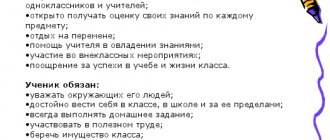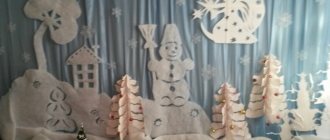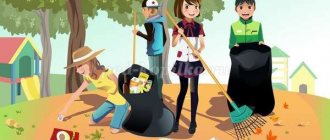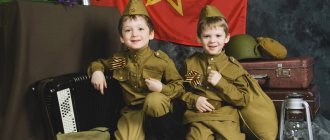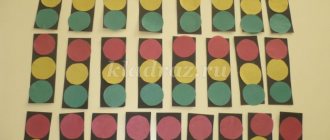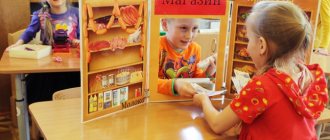Abstract of OOD in the preparatory group on the topic “Travel to the Country of Economics”
Bibliographic description:
Grigorieva, N. R. Abstract of OOD in the preparatory group on the topic “Travel to the Country of Economics” / N. R. Grigorieva, L. A. Reutova, A. A. Ivanova. — Text: direct // Questions of preschool pedagogy. - 2022. - No. 5 (32). — P. 88-90. — URL: https://moluch.ru/th/1/archive/166/5197/ (access date: 01/18/2022).
Program content:
– develop basic economic knowledge and the foundations of economic thinking, enrich economic knowledge through games, practical tasks, problem solving, comparison skills, reasoning, analysis, logic and classification;
– continue to teach awareness, using available practical material, of the relationship between the concepts of “labor-product-money”;
– improve behavioral skills in special game situations, develop various needs;
– expand familiarity with economic categories: inflation, advertising, money, simple financial transactions: receiving and spending money;
– cultivate a friendly, respectful attitude towards work, interest and a positive attitude towards advertising.
Methodical techniques:
– Game motivation: a mysterious letter from a gnome.
– Proverbs and sayings with economic content.
– Problem situation: “find a way.”
– Solving the “Bridge” crossword puzzle.
– Didactic game “Economic Wheel”.
– Questions: Where does the money come from? What are they needed for? Is it possible to live without money? Why? What kind of money is there? What money lasts the longest? What kind of money is convenient to put in your wallet? What would you spend your money on if you won a big sum?
- Physical school.
- Game "Fair".
– Didactic task, riddles and exercises of the Gnome-Economist.
– Reflection.
OOD progress.
— Guys, we received an invitation from the Gnome-Economist to an amazing country called “Economy” (the guys go to the hall decorated as the country “Economy”).
— Before us is the gate leading to the country “Economy”. To get into it, you need to remember proverbs and sayings about economics (children's answers).
- Well done boys! We remembered proverbs and sayings. Now we can safely enter this country (the gates open and the children enter). But where should we go next? We have neither a map nor a diagram! Please note - what kind of signs are these? (the guys look at the signs). If we go to the right, we will get to the Villain of Inflation. What is inflation? (children's answers)
- Absolutely right. Inflation is the depreciation of money. This means that money is worth less and less. They can be used to buy fewer and fewer goods as prices for goods rise. Although people are getting more and more money, they are becoming poorer, not richer. Because food, clothing, shoes - everything is becoming more expensive. Listen to the riddle here:
Chickens don't eat money
Yes, they don’t give much for them.
Because every day
Prices are rising like crazy.
What kind of predator is this?
Is everything eating up our money? (inflation)
- Look, children, what is written on the other sign. If we go to the left, we will end up in a swamp of the poor. Do you guys think it's good to be poor? (children's answers) Why do you think so? (children's answers) What does a person need to do in order not to be poor? (children's answers)
— There is one more way sign left - through the crossword bridge. You must first solve the crossword puzzle before crossing the river.
Questions for the crossword:
- The main activity of a person through which he lives? (work)
- Product of labor created for purchase and sale (product).
- The cost of a product expressed in money (price).
- Foreign money (currency).
- The most precious metal (gold).
- A method of trading in which the buyer wins (auction).
- Well done boys! All questions were answered correctly. Now you can cross the bridge over the river (the guys walk along the bridge). We have overcome the first obstacle.
— There is a strange wheel on our way. Look carefully - this is an economic wheel! It is divided into sectors, each with its own name. Please read (children read: labor, product, money).
— Guys, which of these sectors do you think should come first? (children's answers) Why do you think so? (children's answers)
- Absolutely right. This is work. First, a person must work, work hard to get a product, and then money.
— Let’s look, guys, at the first sector, “labor.” I invite everyone to choose any picture depicting a person who does this or that work, and name what kind of work he is doing (children’s answers).
- Guys, you named everything correctly. Well done! How should a person work? (children's answers) Of course, a person should like work, it should be done efficiently and conscientiously.
- What is the result of labor - a useful and necessary thing, object or product? (children's answers) This is the “product” - the second sector of the economic wheel. For your pictures, select a second picture - with the product of human labor (children select the corresponding pictures). If a person has worked conscientiously and put his whole soul into this work, what will the product of his labor be? (children's answers) Of course, it will be of high quality. And it will cost more, because a lot of time was spent on its production. Also, the price of a product depends on the material from which it is made.
— The third sector on the economic wheel is designated “money.” How can you get money from the product of labor? (children's answers) That's right, the product needs to be sold and sold. There is a box on this sector. What does it contain? (the guys open the box, and there is real money there). What is money? (children's answers) Money is a special (product) product that can be exchanged for any other product.
-Where does the money come from? What are they needed for? Is it possible to live without money? Why? What kind of money is there? What money lasts the longest? What kind of money is convenient to put in your wallet? What would you spend your money on if you won a big sum? (children's answers)
Physical school
We ran along the track (running in place)
Suddenly, the sandals broke! (one loud clap)
What to do? What should we do? (we spread our arms alternately to the sides)
Where can we get shoes? (cup your cheeks with your palms and shake your head)
Let's buy shoes! (stomp your feet to the rhythm of the words 4-7 times)
Let's start counting money! (Rub your other fingers with your thumb, with both hands at the same time)
One (ruble), two, three, four (casually clap the left palm with the right palm and vice versa, 4 claps)
So we bought shoes! (we point our hands at the shoes, placing either the right or the left foot on the heel)
- Guys, in this box, in addition to money, there is also a diagram. Look carefully, what does it remind us of? (children's answers) Yes, this is a scheme for finding the treasure! (children look carefully at the diagram, look for treasure, find a chest).
- What is in this chest?! (the guys open the chest and take out wallets with money from it) Just what we need. Now, guys, we can go to the “Fair”, buy a gift for the Gnome-Economist and a souvenir for ourselves in memory of this country.
Game "Fair".
- Children, do not forget that frugality is the best wealth. When purchasing, carefully examine the product to ensure it is of high quality. You need to try to save your money. (the guys play the game “Fair”).
- So we made all the purchases. Show each other what you have purchased. Based on your emotions, we can say that you are all happy with your purchases! Count how much money you have left (children count the remaining money). We bought a gift for the Gnome-Economist and need to give it to him. And he lives in this house (a child appears dressed in a Dwarf costume).
— Hello, Gnome-Economy! Are you not happy, are you hanging your nose? We brought you a gift. Please accept it from us! (children present a gift)
- Thank you (sadly says Gnome-Economy).
- Gnome-Economy, what happened? Are you upset about something?
“I’m sad because my letters fell apart.” Now I can’t make a word out of them.
- Don’t worry, our children will help you (the children make up the word “Advertising” from the letters).
— The word “Advertising” came out.
- Thank you guys! You helped me so much!
- Where can you find advertising? (children's answers) That's right, guys, you said that advertising can be heard on TV, seen on street billboards, in public transport, in newspapers, magazines. Look at the pillars - there are advertising sheets on them. What is advertising for? (children's answers) Advertising is necessary in order to attract buyers and create wide popularity for the product of labor.
- Who makes the advertising? (children's answers) That's right, this is an advertising agent. Gnome-Economy, our children, like advertising agents, can make advertisements. Look at this (the guys show the advertisements they created).
- Well done! Very interesting advertisements! I will tell you riddles, and you try to guess them:
- If I add part of a face to the word “bank”,
I'll give you another word.
This word means: “I will go broke”, “I will never rise” (bankrupt).
- I help with the “T” in battle,
With “B” I save money (tank and bank).
- You found the correct answers. I give you this book with crosswords, puzzles, riddles. Think, play, reason!
- Thank you, Gnome-Economy! Goodbye! (Gnome-Economy leaves)
— Guys, what new have you learned in the country “Economy”? What did you like most? (children's answers) Today you learned a lot of interesting things about economics. We played the game “Fair”, where you could buy souvenirs and understand what money is for, how to earn it, how a person needs to work. Well done! It's time for us, guys, to return to kindergarten from the country of "Economy".
Key terms
(automatically generated)
: children's answer, money, guys, product of labor, child, advertising, economic wheel, money, game, well done.
